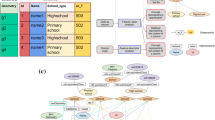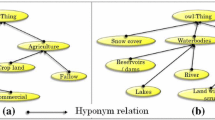Abstract
In a decision-making context, multidimensional geospatial databases are very important. They often represent data coming from heterogeneous and evolving sources. Evolution of multidimensional structures makes difficult, even impossible answering to temporal queries, because of the lack of relationships between different versions of spatial cubes created at different time. This paper proposes a semantic similarity model redefined from a model applied in the ontological field to establish semantic relations between data cubes. The proposed model integrates several types of similarity components adapted to different hierarchical levels of dimensions in multidimensional databases and also integrates similarity between features of concepts. The proposed model has been applied to a set of specifications from different inventory in Montmorency Forest in Canada. Results show that the proposed model improves precision and recall compared to the original model. Finally, further investigation is suggested in order to integrate the proposed model to SOLAP tools as future works.
An erratum to this chapter can be found at http://dx.doi.org/10.1007/11915072_109.
Preview
Unable to display preview. Download preview PDF.
Similar content being viewed by others
References
Rivest, S., Bédard, Y., Proulx, M.-J., Nadeau, M., Hubert, F., Pastor, J.: SOLAP Technology : Merging Business Intelligence with Geospatial Technology for Interactive Spatio-Temporal Exploration and Analysis of Data. ISPRS Journal of Photogrammetry and Remote Sensing 60, 17–33 (2005)
Body, M., Miquel, M., Bédard, Y., Tchounikine, A.: A Multidimensional and Multiversion Structure for OLAP Applications. In: Procceedings of the 5th ACM international workshop on Data Warehousing and OLAP (2002)
Thurnheer, A.: Les Changements dans les Bases de Données Analytiques. In: Information als Erfolgsfactor, Teubner, Stuttgart (2000)
Eder, J., Koncilia, C., Mitsche, D.: Automatic Detection of Structural Changes in Data Warehouses. In: Kambayashi, Y., Mohania, M., Wöß, W. (eds.) DaWaK 2003. LNCS, vol. 2737, pp. 119–128. Springer, Heidelberg (2003)
Mendelzon, A.O., Vaisman, A.A.: Temporal Queries in OLAP. In: Proceedings of the 26th VLDB Conference, Cairo, Egypt (2000)
Eder, J., Koncilia, C., Morzy, T.: The COMET Metamodel for Temporal Data Warehouses. In: Pidduck, A.B., Mylopoulos, J., Woo, C.C., Ozsu, M.T. (eds.) CAiSE 2002. LNCS, vol. 2348, p. 83. Springer, Heidelberg (2002)
Morzy, T., Wrembel, R.: On querying Versions of Multiversion Data Warehouse. In: DOLAP 2004, Washington, DC, USA (2004)
Gruber, T.R.: Toward Principles for the Design of Ontologies used for Knowledge Sharing. International Journal of Human–Computer Studies 43, 907–928 (1995)
Klein, M.: Combining and Relating Ontologies: an Analysis of Problems and Solution. In: IJCAI-2001 Workshop on Ontologies and Information Sharing, Seattle, WA, pp. 53–62 (2001)
Eder, J., Koncilia, C.: Modelling Changes in Ontologies. In: Meersman, R., Tari, Z., Corsaro, A. (eds.) OTM-WS 2004. LNCS, vol. 3292, pp. 662–673. Springer, Heidelberg (2004)
Sure, Y., Staab, S., Studer, R.: On-To-Knowledge Methodology (OTKM). In: Staab, S., Studer, R. (eds.) Handbook on Ontologies, pp. 117–132. Springer, Heidelberg (2004)
Ehrig, M., Sure, Y.: Ontology Mapping – An Integrated Approach. In: Bussler, C.J., Davies, J., Fensel, D., Studer, R. (eds.) ESWS 2004. LNCS, vol. 3053, pp. 76–91. Springer, Heidelberg (2004)
Su, X., Gulla, J.A.: Semantic Enrichment for Ontology Mapping. In: Meziane, F., Métais, E. (eds.) NLDB 2004. LNCS, vol. 3136, pp. 217–228. Springer, Heidelberg (2004)
Euzenat, J., Valtchev, P.: Similarity-Based Ontology Alignment in OWL-Lite. In: The 16th European Conference on Artificial Intelligence, Valencia, Spain (2004)
Rada, R., Mili, H., Bicknell, E., Blettner, M.: Developement and Application of a Metric on Semantic Nets. IEEE Transactions on Systems, Man and Cybernetics 19(1), 17–30 (1989)
Wu, Z., Palmer, M.: Verb Semantic and Lexical Selection. In: Proceedings of the 32nd Annual Meeting of the Association for Computational Linguistic, Las Cruses, New Mexico (1994)
Jiang, J.J., Conrath, D.W.: Semantic Similarity Based on Corpus Statistics and Lexical Taxonomy. In: Proceedings of the International Conference on Research in Computational Linguistic, Taiwan (1998)
Hirst, G., St-Onge, D.: Lexical Chains as Representations of Context for the Detection and Correction of Malapropisms. In: Fellbaum, C. (ed.) WordNet: An Electronic Lexical Database. The MIT Press, Cambridge (1998)
Tversky, A.: Features of Similarity. Psychological Review 84(4), 327–352 (1977)
Rodriguez, M.A.: Assessing Semantic Similarity Among Entity Classes. Thèse de doctorat, University of Maine (2000)
Zurita, V.: Semantic-Based Approach to Spatial Data Sources Integration. PhD Thesis, Universitat Politecnica de Catalunya (2004)
Resnick, P.: Semantic Similarity in a Taxonomy: An Information-Based Measure and its Application to Problems of Ambiguity in Natural Language. Journal of Artificial Intelligence Research 11, 95–130 (1999)
Seco, N., Veale, T., Hayes, J.: An Intrinsic Information Content Metric for Semantic Similarity in WordNet. In: Proceedings of ECAI 2004, the 16th European Conference on Artificial Intelligence (2004)
Gärdenfors, P.: Conceptual Spaces: The Geometry of Thought. MIT Press, Cambridge (2000)
Schwering, A.: Hybrid Model for Semantic Similarity Measurement. In: OTM Conferences, vol. (2), pp. 1449–1465 (2005)
Salton, G., Buckley, C.: Improving Retrieval Performance by Relevance Feed-Back. Journal of the American Society for Information Science 14(4), 288–297 (1990)
Knappe, R., Bulskov, H., Andreasen, T.: On Similarity Measures for Content-Based Querying. In: De Baets, B., Kaynak, O., Bilgiç, T. (eds.) IFSA 2003. LNCS, vol. 2715, pp. 400–403. Springer, Heidelberg (2003)
Carbo-Dorca, R., Besalu, E.: A General Survey of Molecular Quantum Similarity. J. Mol. Struct-Theochem 451(1-2), 11–23 (1998)
Author information
Authors and Affiliations
Editor information
Editors and Affiliations
Rights and permissions
Copyright information
© 2006 Springer-Verlag Berlin Heidelberg
About this paper
Cite this paper
Bakillah, M., Mostafavi, M.A., Bédard, Y. (2006). A Semantic Similarity Model for Mapping Between Evolving Geospatial Data Cubes. In: Meersman, R., Tari, Z., Herrero, P. (eds) On the Move to Meaningful Internet Systems 2006: OTM 2006 Workshops. OTM 2006. Lecture Notes in Computer Science, vol 4278. Springer, Berlin, Heidelberg. https://doi.org/10.1007/11915072_72
Download citation
DOI: https://doi.org/10.1007/11915072_72
Publisher Name: Springer, Berlin, Heidelberg
Print ISBN: 978-3-540-48273-4
Online ISBN: 978-3-540-48276-5
eBook Packages: Computer ScienceComputer Science (R0)




